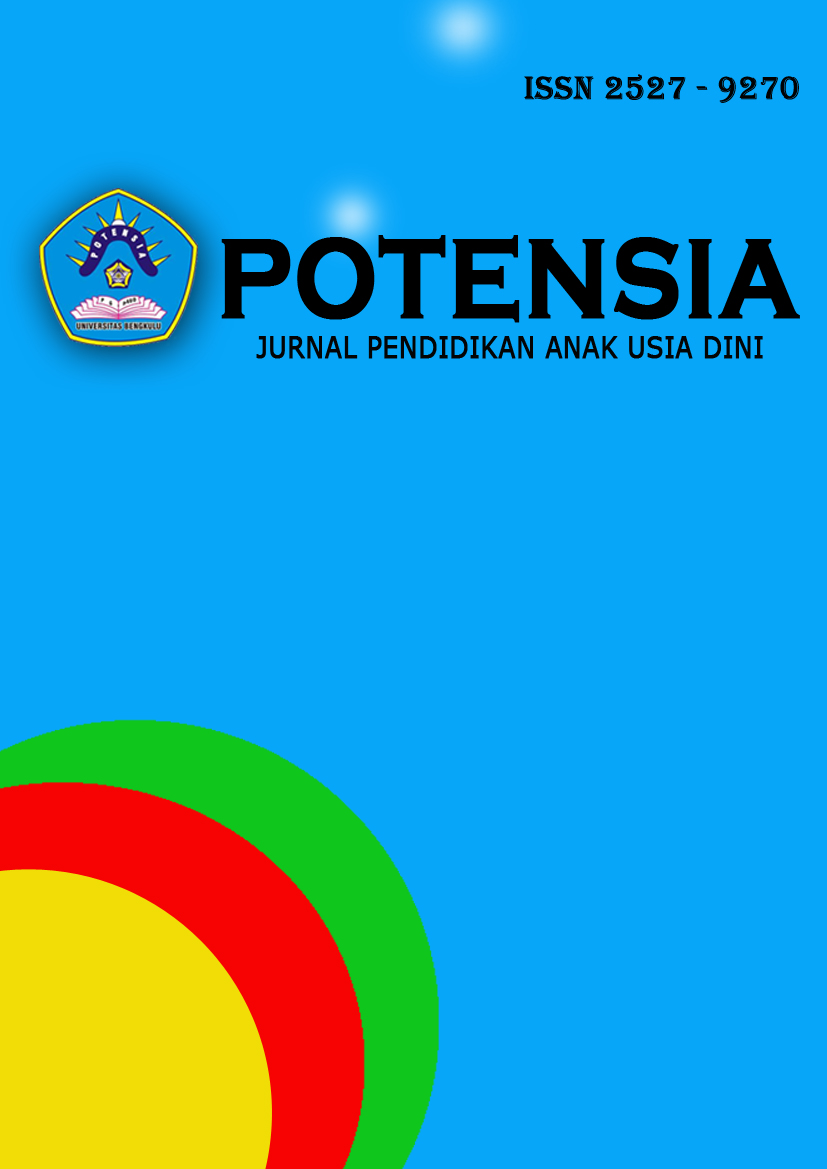Main Article Content
Abstract
This study aims to describe the relationship between methods of habituation in learning with early childhood discipline in early childhood Al-Hidayah Kota Bengkulu. The method used is descriptive quantitative with correlation type. The subjects were 30 children consisting of 8 children of B1 group, 8 children of B2 group, 7 children of B3 group and 7 children of B4 group. Technique of collecting data using observation in the form of checklist. Data analysis using Product Moment Correlation. The result of this research is there is significant correlation between method of habituation in learning with discipline of child and seen from price Fhitung0,418 bigger than price Ftabel0,374 for significant level 5% (0,418 <0,374) so that Ha accepted and Ho rejected. Based on these results it is advisable to train early childhood discipline should teachers apply methods of habituation.
Keywords: Method of Habituation in Learning, Discipline of Early Childhood
Article Details
Authors who publish with this journal agree to the following terms:
- Authors retain copyright and grant the journal right of first publication with the work simultaneously licensed under a Creative Commons Attribution License that allows others to share the work with an acknowledgment of the work's authorship and initial publication in this journal.
- Authors are able to enter into separate, additional contractual arrangements for the non-exclusive distribution of the journal's published version of the work (e.g., post it to an institutional repository or publish it in a book), with an acknowledgment of its initial publication in this journal.
- Authors are permitted and encouraged to post their work online (e.g., in institutional repositories or on their website) prior to and during the submission process, as it can lead to productive exchanges, as well as earlier and greater citation of published work (See The Effect of Open Access).
- This work is licensed under a Creative Commons Attribution-ShareAlike 4.0 International License.
References
- DAFTAR PUSTAKA
- Amin, M Maswardi. 2015. Pendidikan Karakter Anak Bangsa.Yogyakarta: Hak Cipta.
- Aqib, Zainal. 2011. Pendidikan Karakter Membangaun Perilaku Positif Anak Bangsa: CV. RAMA WIDYA.
- Djaali. 2013. Psikologi Pendidikan.Jakarta: Bumi Aksara.
- Hasan. 2012. Pedoman Pendidikan Karakter pada Pendidikan Anak Usia Dini. Jakarta: PT Bumi Aksara.
- Hasnida. 2014. Analisis Kebutuhan Anak Usia Dini. Jakarta: Luxima
- Mahmud. 2011. Analisa Data Kuantitatif. Jakarta: UI Press.
- Mulyasa. 2012. Manajemen Pendidikan Karakter. Jakarta: Bumi Aksara.
- Subagyo, Joko. 2011. Metode Penelitian dalam Teori dan Praktik. Jakarta: Rineka Cipta
- Sujiono, Yuliani Nurani. 2011. Konsep Dasar Pendidikan Anak Usia Dini. Jakarta: PT Indeks.
- Syarbini, Amirulloh. 2014. Model Pendidikan Karakter dalam Keluarga. Jakarta : PT Elex Media Komputindo.
- Undang-Undang Nomor 20 Tahun 2003 Bab I Pasal 1 butir 10 tentang Sistem Pendidikan Nasional.
References
DAFTAR PUSTAKA
Amin, M Maswardi. 2015. Pendidikan Karakter Anak Bangsa.Yogyakarta: Hak Cipta.
Aqib, Zainal. 2011. Pendidikan Karakter Membangaun Perilaku Positif Anak Bangsa: CV. RAMA WIDYA.
Djaali. 2013. Psikologi Pendidikan.Jakarta: Bumi Aksara.
Hasan. 2012. Pedoman Pendidikan Karakter pada Pendidikan Anak Usia Dini. Jakarta: PT Bumi Aksara.
Hasnida. 2014. Analisis Kebutuhan Anak Usia Dini. Jakarta: Luxima
Mahmud. 2011. Analisa Data Kuantitatif. Jakarta: UI Press.
Mulyasa. 2012. Manajemen Pendidikan Karakter. Jakarta: Bumi Aksara.
Subagyo, Joko. 2011. Metode Penelitian dalam Teori dan Praktik. Jakarta: Rineka Cipta
Sujiono, Yuliani Nurani. 2011. Konsep Dasar Pendidikan Anak Usia Dini. Jakarta: PT Indeks.
Syarbini, Amirulloh. 2014. Model Pendidikan Karakter dalam Keluarga. Jakarta : PT Elex Media Komputindo.
Undang-Undang Nomor 20 Tahun 2003 Bab I Pasal 1 butir 10 tentang Sistem Pendidikan Nasional.
